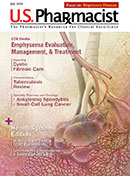Patients receiving hematopoietic stem-cell transplantation have impaired immunity from chemotherapy regimens on top of any underlying diseases they might have. That puts them at high risk of developing herpes zoster.
While antiviral prophylaxis is the current standard of care to reduce herpes zoster risk, vaccination offers an additional means to prevent herpes zoster. One problem, however, is that live-attenuated vaccines are generally contraindicated in immunocompromised patients.
A nonlive, adjuvanted recombinant zoster vaccine (RZV), marketed as Shingrix, is approved for use in adults aged 50 years and older in the European Union, United States, Canada, Australia, Japan, and China.
"This vaccine is highly efficacious at preventing herpes zoster in adults over 50 years of age, as demonstrated in large, placebo-controlled randomized trials," University of Pennsylvania–led authors write. "Importantly, Shingrix use is not contraindicated in immunocompromised conditions, and was found to be highly efficacious in adults who had recently undergone autologous hematopoietic stem cell transplant."
In fact, the study team found that two doses elicited high and persistent immune responses. "Data presented here further support our understanding of the impact of specific factors such as age or underlying diseases on the vaccine's effect in the population studies, as well as the characteristics of the elicited cell-mediated immune responses," the authors point out. Results were published in Human Vaccines & Immunotherapeutics.
The researchers sought to provide an "in-depth description of humoral and cell-mediated immune (CMI) responses by age (protocol-defined) or underlying disease (post-hoc) as well as efficacy by underlying disease (post-hoc) of the adjuvanted recombinant zoster vaccine (RZV)" in a randomized observer-blind phase III trial (ZOE-HSCT, NCT01610414).
Participants included 1,846 adult auHSCT recipients who were randomized to receive a first dose of either RZV or placebo 50 to 70 days postautologous haematopoietic stem cell transplantation (auHSCT), followed by the second dose at 1 to 2 months later.
At 1 month following the second vaccine dose, in cohorts of 114 to 1,721 participants, anti-gE antibody geometric mean concentrations (GMCs) and median gE-specific CD4[2+] T-cell frequencies (CD4 T-cells expressing >2 of four assessed activation markers) were found to be similar between subjects ages 18 to 49 years and those aged 50 years and older.
"Despite lower anti-gE antibody GMCs in non-Hodgkin B-cell lymphoma (NHBCL) patients, CD4[2+] T-cell frequencies were similar between NHBCL and other underlying diseases," the authors wrote. "The proportion of polyfunctional CD4 T-cells increased over time, accounting for 79.6% of gE-specific CD4 T-cells at 24 M post dose two. Vaccine efficacy against HZ ranged between 42.5% and 82.5% across underlying diseases and was statistically significant in NHBCL and multiple myeloma patients."
The study concluded that two RZV doses administered early postauHSCT induced robust, persistent, and polyfunctional gE-specific immune responses, adding that efficacy against HZ was also high in NHBCL patients despite the lower humoral response.
"These results indicate that Shingrix, given shortly after hematopoietic stem cell transplant, can induce robust immune responses and reduce the risk of herpes zoster, even in individuals with immunosuppression due to underlying disease and/or use of immunosuppressive therapies, regardless of age or underlying disease," the authors emphasize.
The content contained in this article is for informational purposes only. The content is not intended to be a substitute for professional advice. Reliance on any information provided in this article is solely at your own risk.
« Click here to return to Vaccine Update.
Published September 27, 2021






